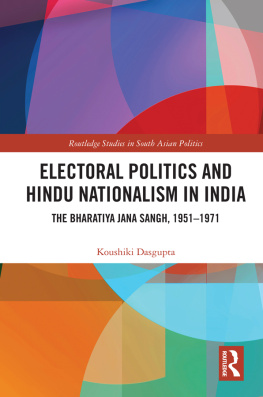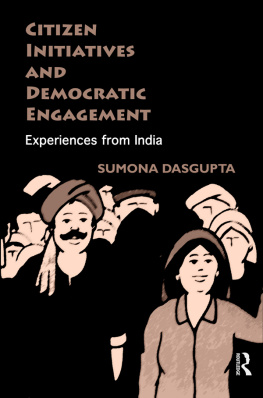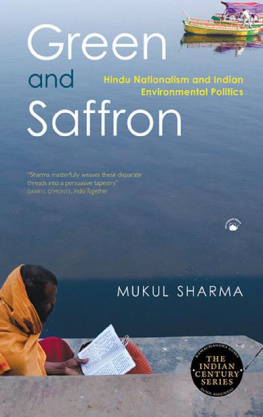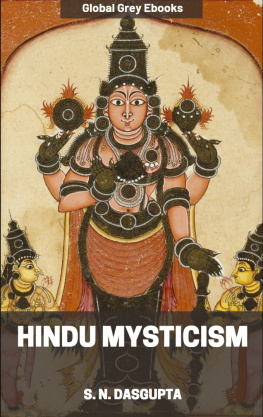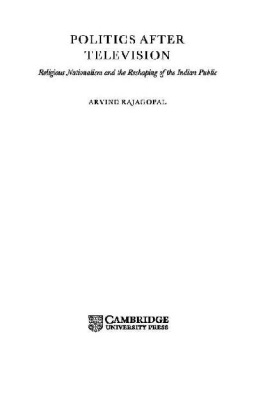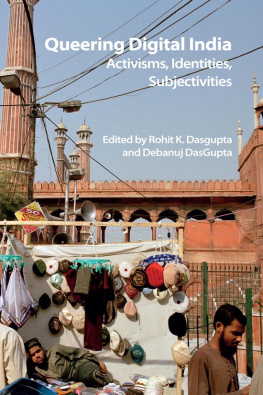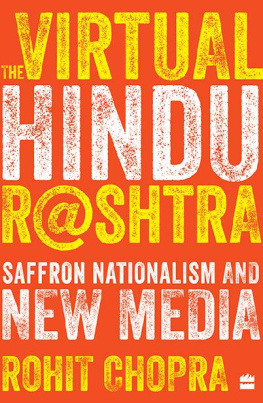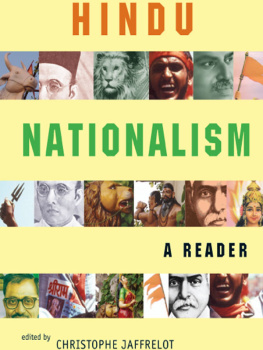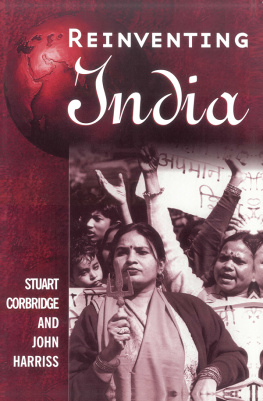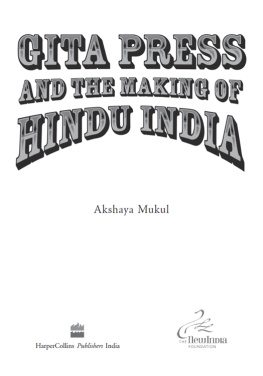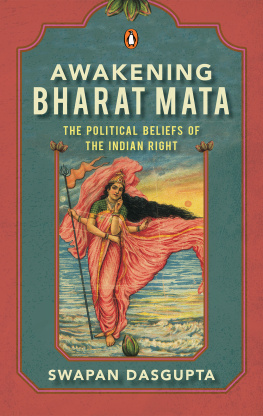Dasgupta Koushiki - Electoral Politics and Hindu Nationalism in India
Here you can read online Dasgupta Koushiki - Electoral Politics and Hindu Nationalism in India full text of the book (entire story) in english for free. Download pdf and epub, get meaning, cover and reviews about this ebook. year: 2019, publisher: Taylor & Francis Group, genre: Politics. Description of the work, (preface) as well as reviews are available. Best literature library LitArk.com created for fans of good reading and offers a wide selection of genres:
Romance novel
Science fiction
Adventure
Detective
Science
History
Home and family
Prose
Art
Politics
Computer
Non-fiction
Religion
Business
Children
Humor
Choose a favorite category and find really read worthwhile books. Enjoy immersion in the world of imagination, feel the emotions of the characters or learn something new for yourself, make an fascinating discovery.
- Book:Electoral Politics and Hindu Nationalism in India
- Author:
- Publisher:Taylor & Francis Group
- Genre:
- Year:2019
- Rating:4 / 5
- Favourites:Add to favourites
- Your mark:
- 80
- 1
- 2
- 3
- 4
- 5
Electoral Politics and Hindu Nationalism in India: summary, description and annotation
We offer to read an annotation, description, summary or preface (depends on what the author of the book "Electoral Politics and Hindu Nationalism in India" wrote himself). If you haven't found the necessary information about the book — write in the comments, we will try to find it.
Electoral Politics and Hindu Nationalism in India — read online for free the complete book (whole text) full work
Below is the text of the book, divided by pages. System saving the place of the last page read, allows you to conveniently read the book "Electoral Politics and Hindu Nationalism in India" online for free, without having to search again every time where you left off. Put a bookmark, and you can go to the page where you finished reading at any time.
Font size:
Interval:
Bookmark:

This book analyzes the rise and growth of the Hindu nationalist party, Bharatiya Jana Sangh, in post-independent India, tracking the electoral journey of the party from 1951 to 1971.
Offering a comprehensive analysis of the Bharatiya Jana Sangh party its origin, ideas and electoral performances in the first two decades of its journey the book provides an overview of the state-wide electoral record of the party mobilizing Hindu support and managing factional disputes. It surveys the issues of conflicts between the intraparty factions dominated by the recruits from the Rastriya Swayamseyak Sangh and the others. The author also presents a critique of the Hindutva politics of the Bharatiya Jana Sangh on account of its somewhat imperfect appeal among the masses and its problems in raising real issues of socio-economic concern. With a special emphasis on the states situated outside the Hindi language belt of Northern India, the electoral outcome of the Jana Sangh during each national and state legislative election is analyzed. Based on the dialectics of ideology and exigency, this book makes a thorough investigation of the leadership-succession crises in the party, patterns of vote sharing at the regional level and trends of coalition with the non-Congress parties in the states.
Providing a nuanced understanding of the process leading to the strengthening of right-wing political parties in India, the book will be of interest to academics working in the fields of nationalism, party politics and South Asian politics.
Koushiki Dasgupta is Vidyasagar Chair Professor in the Department of History at Vidyasagar University, India.
The Socio-political Ideas of BR Ambedkar
Liberal constitutionalism in a creative mould
Bidyut Chakrabarty
The Politics of US Aid to Pakistan
Aid Allocation and Delivery from Truman to Trump
Murad Ali
India, Democracy and Constitutional Identity
Ideological Beliefs and Preferences
Bidyut Chakrabarty
Sharia and the State in Pakistan
Blasphemy Politics
Farhat Haq
Gender and Hindu Nationalism
Understanding Masculine Hegemony
Prem Kumar Vijayan
Hindu Nationalism in India
Ideology and Politics
Bidyut Chakrabarty and Bhuwan Jha
Electoral Politics and Hindu Nationalism in India
The Bharatiya Jana Sangh, 19511971
Koushiki Dasgupta
Government and NGOs in South Asia
Local Collaboration in Bangladesh
Mohammad Jahangir Hossain Mojumder and Pranab Kumar Panday
For more information about this series, please visit: www.routledge.com/asianstudies/series/RSSAP

First published 2020
by Routledge
2 Park Square, Milton Park, Abingdon, Oxon OX14 4RN
and by Routledge
52 Vanderbilt Avenue, New York, NY 10017
Routledge is an imprint of the Taylor & Francis Group, an informa business
2020 Koushiki Dasgupta
The right of Koushiki Dasgupta to be identified as author of this work has been asserted by her in accordance with sections 77 and 78 of the Copyright, Designs and Patents Act 1988.
All rights reserved. No part of this book may be reprinted or reproduced or utilised in any form or by any electronic, mechanical, or other means, now known or hereafter invented, including photocopying and recording, or in any information storage or retrieval system, without permission in writing from the publishers.
Trademark notice: Product or corporate names may be trademarks or registered trademarks, and are used only for identification and explanation without intent to infringe.
British Library Cataloguing-in-Publication Data
A catalogue record for this book is available from the British Library
Library of Congress Cataloging-in-Publication Data
A catalog record for this book has been requested
ISBN: 978-0-367-44131-9 (hbk)
ISBN: 978-1-003-00386-1 (ebk)
Typeset in Times New Roman
by Apex CoVantage, LLC
To Ma and Baba
This book was written as part of a research project funded by the Indian Council of Historical Research, New Delhi, from 20162017. I was nudged into investigating the extensive terrain of Hindu nationalist politics when I found that the ideology of Hindu nationalism had appeared to be an intellectual challenge to the left-liberal ideology that had occupied an important place in the political landscape of post-independent India. The rise of the Bharatiya Jana Sangh presented one of the most glaring examples of translating that ideology into practise by making all Hindus a homogeneous whole. The coming of the Bharatiya Jana Sangh in 1951 was much more than an average political phenomenon based on some petty number games; rather it brought to the front a unique brand of nationhood which kept on receiving inspirations from different sources. With the expansion of its influence over the electoral domain, the party attracted various caste groups and caste parties which had so far remained tangential in the mainstream political agenda. Despite having a visible presence in the electoral arenas, the party was confronted with the Nehruvian visions of a secular-socialist accord over the political discourse in India. Jana Sanghs close association with the RSS often charged the party with engaging in communal politics in the name of Hindu nationalism. Apart from struggling with the hostilities of the Congress elite and a section of the English language media, the party registered some amount of success in bringing a host of non-Congress parties close to the boundaries of a majoritarian politics in later years. In its attempts to get away with the fault lines of political untouchability, the Jana Sangh developed its own brand of intellectual assets and institutional networks by carving out a small but powerful niche for itself. Despite being stigmatised for their supposed propagation of Hindutva, chanting Hindi chauvinist mantras and promoting urban-upper caste values, the Jana Sangh leaders came out with an alternative vision of parliamentary politics in independent India.
My interest on the subject grew mostly out of the curiosity of what attracts people to the ideology of Hindu nationalism and to its subsequent political expressions. The Modi waves in the recent years also fetched me enough scopes and possibilities to closely scrutinize the ideology and its political character. I also found it quite misleading to tag the so-called Hindu rightist parties loosely with the vexed connotations of Hindutva, especially when a plethora of popular perceptions were invested in invoking different degrees of alternative readings. I owe an immense debt of gratitude to all of the staff at the Nehru Memorial Museum and Library in New Delhi for providing me access to their archival resources, especially to the private paper collections. I thank the staff at the National Library, Kolkata; the National Archives, New Delhi, the Asian and African section of the British Library, London; and the office workers of the RSS, Hindu Mahasabha and the Bharatiya Janata Party in New Delhi. I am extremely grateful to Swmi Mokshananda, Swami Ganeshananda, and Swami Barunananda of the Bharat Sevashram Sangha for their kindness and blessings. I wish to express my heartiest thanks to the political leaders and journalists, those who have helped me by providing valuable information and materials essential for my research. I want to thank all of my ex-colleagues and students at the University of Gour Banga, Malda, at the Diamond Harbour Womens University, South 24 Parganas and the Honourable Vice Chancellor of Vidyasagar University, Midnapore. I am also thankful to Dr. Subodh Sarkar, Dr. Sudhir Singh, and my beloved brother Virendra Singh for extending unconditional support and encouragement over the years.
Font size:
Interval:
Bookmark:
Similar books «Electoral Politics and Hindu Nationalism in India»
Look at similar books to Electoral Politics and Hindu Nationalism in India. We have selected literature similar in name and meaning in the hope of providing readers with more options to find new, interesting, not yet read works.
Discussion, reviews of the book Electoral Politics and Hindu Nationalism in India and just readers' own opinions. Leave your comments, write what you think about the work, its meaning or the main characters. Specify what exactly you liked and what you didn't like, and why you think so.

